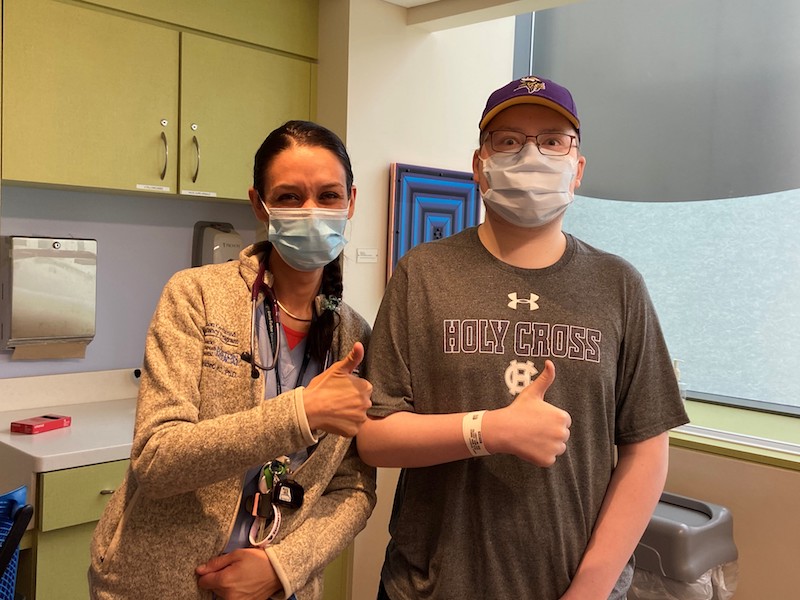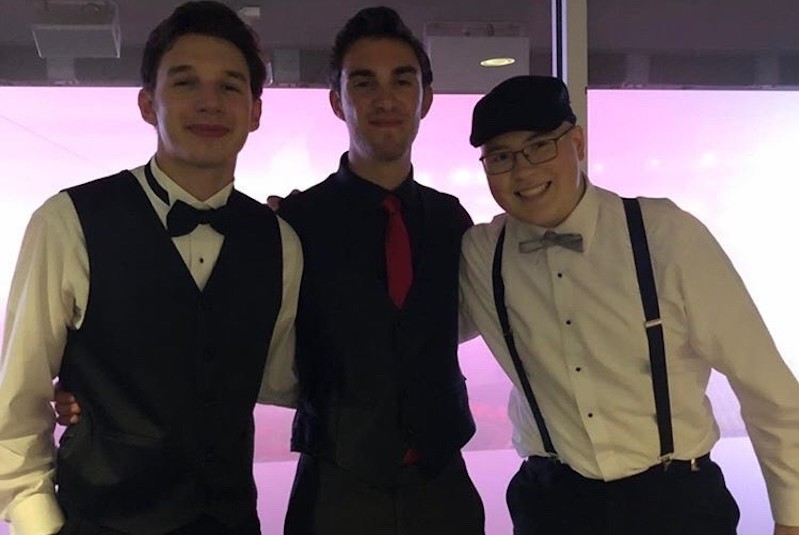Cancer won’t stop me, and neither will COVID-19

Most people my age look at COVID-19 as a burden on their everyday lives of seeing friends, hanging out, and going to college. I see it differently.
As an active cancer patient being treated for T-cell acute lymphoblastic leukemia (ALL), I am immunocompromised. This puts me at especially high risk for contracting COVID-19, and my family must be even more careful than others about where we go and what we bring into our home.
The only time any of us really leaves the house is for my appointments at the Jimmy Fund Clinic, the oncology clinic of Dana-Farber/Boston Children’s Cancer and Blood Disorders Center. That’s okay. After all I’ve been through the last year, I’m not letting COVID-19 keep me from feeling optimistic about my future.
How it all started
I started having chest pains in the winter of 2019, when I was finishing up my senior year of high school. It wasn’t too bad at first, but one night I woke up with terrible pain in my lymph nodes as well. My parents took me to the doctor, and then to the hospital. That same day, March 15, I was diagnosed with T-cell ALL.
For nearly a month, I lived at Boston Children’s Hospital at the start of my two-year treatment protocol. I made it home in time for prom and graduation and was accepted at the College of the Holy Cross for the fall. But because the first year of my cancer treatment required me to be at the clinic at least once every two weeks, my family talked with my oncologist, Dr. Kimberly Davies, and made a decision: I’d take a gap year, get through the hardest part of treatment, and then start at Holy Cross in fall 2020.

The next nine months were tough. My treatment days at the Jimmy Fund Clinic were Fridays, so I felt lousy every weekend and a lot of other days, too. Because my friends were away at college, there was nobody to hang out with, and I didn’t feel strong enough to go out anyway. It wasn’t until this January that I finally started wanting to see people again.
Then came the pandemic.
Playing the waiting game
Early on, I was like most kids my age, and didn’t really worry about COVID-19. There were so few recorded cases in the U.S., and my first big event since graduation was coming up: a trip to Florida and Boston Red Sox spring training with other teen cancer patients from Dana-Farber/Boston Children’s. It was only when the trip was canceled, and my younger sister’s school closed, that I started realizing things were more serious than we originally thought.
These days, when I see photos on Instagram and stories on Snapchat of couples going on dates, groups gathering, or people protesting the stay-at-home orders, it makes me furious. They are not just endangering my life, but also the lives of everybody else treated at Dana-Farber — along with the elderly and others with pre-existing health conditions.
And yet, even though I am mad whenever I see people refusing to socially distance, I also get a bit jealous. If I wasn’t going through treatment right now, I still wouldn’t be seeing people. But it would be nice to have the option, no matter how ill-advised.
At least there’s texting and Zoom so I can keep in touch with my friends and extended family. And more than anything, I’m looking forward to starting at Holy Cross in the fall — whether on campus or online. Everyone I know there had a great freshman year before it ended prematurely, and I want to experience that myself however it’s possible.
I’m optimistic that the worst of the COVID-19 pandemic will end soon, and the second it is safe to do, I’m going to go out and see as many people as humanly possible — but not a minute before.
This post originally ran on the Dana-Farber Cancer Institute’s blog, Insight.
Get more answers about Boston Children’s response to COVID-19.
Related Posts :
-

A true hero’s journey: How a team approach helped Wolfie overcome pancreatitis
Wolfgang, affectionately known as “Wolfie,” is a bright and energetic 7-year-old with a quick wit and a love for making ...
-

A toast to BRD4: How acidity changes the immune response
It started with wine. Or more precisely, a conversation about it. "My colleagues and I were talking about how some ...
-

A new druggable cancer target: RNA-binding proteins on the cell surface
In 2021, research led by Ryan Flynn, MD, PhD, and his mentor, Nobel laureate Carolyn Bertozzi, PhD, opened a new chapter ...
-

Forecasting the future for childhood cancer survivors
Children are much more likely to survive cancer today than 50 years ago. Unfortunately, as adults, many of them develop cardiovascular ...





